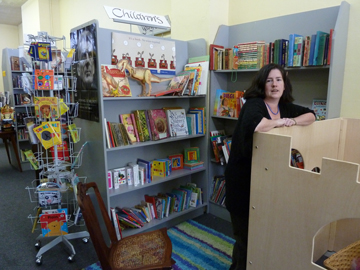 Néna Rawdah’s heritage is Lebanese and she is originally from Texas, but what you hear when she speaks is all books. She’s worked in the Portland book scene for years, and then she and a business partner started St. Johns Booksellers, named after its North Portland neighborhood, in June 2005. Rawdah’s been standing strong the past couple of years as sole owner. (She counts her husband as a business partner as well, but he works full-time outside of the book world.)
Néna Rawdah’s heritage is Lebanese and she is originally from Texas, but what you hear when she speaks is all books. She’s worked in the Portland book scene for years, and then she and a business partner started St. Johns Booksellers, named after its North Portland neighborhood, in June 2005. Rawdah’s been standing strong the past couple of years as sole owner. (She counts her husband as a business partner as well, but he works full-time outside of the book world.)
North Portland is the city’s “fifth quadrant,” and many consider St. Johns the outback of this outback. Those who live in and love this neighborhood disagree, seeing instead a racially and economically diverse place, one attractive to artists and brimming with natural spaces and, yes, still very much accessible to the rest of Portland. Néna’s an eloquent spokesperson for our region’s book business, so let’s get on to her thoughts on it.
Really, the Broadway Books blog post hit the nail on the head. Our circumstances are similar, and our answers are similar. We depend on our customers and count on them to choose us for their book needs. If they keep doing that, we’ll be here to help them.
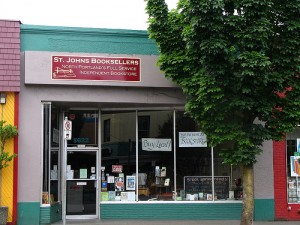 What’s your store’s position in the world of bookstores? Are you a resource for North Portland, or St. Johns, or do you serve a more varied role? Bookstores have relationships in much the same way that people do. There’s an inner circle of close connections, and expanding ripples of progressively looser or more specialized relationships. We have nearby neighbors who walk to the store to browse a little of everything, let their kids play and place their special orders here. We have people who drive over as part of a regular circuit of used bookstores. And we have folks who will make an occasional special trip either for an author event or for something specific, a collectible book or a book on Northwest railroad history, which is one of our strengths.
What’s your store’s position in the world of bookstores? Are you a resource for North Portland, or St. Johns, or do you serve a more varied role? Bookstores have relationships in much the same way that people do. There’s an inner circle of close connections, and expanding ripples of progressively looser or more specialized relationships. We have nearby neighbors who walk to the store to browse a little of everything, let their kids play and place their special orders here. We have people who drive over as part of a regular circuit of used bookstores. And we have folks who will make an occasional special trip either for an author event or for something specific, a collectible book or a book on Northwest railroad history, which is one of our strengths.
In a city like Portland, which has several bookstores, and in a world like ours, in which even independent bookstores can sell paper books and e-books online, how does reader choose which indie she’ll support? I think there’s room in readers’ hearts for more than one bookstore. We all have different “special powers.” The thing is to shop where your heart is. If your neighborhood matters to you, shop your neighborhood bookstore. If you have a specialized need, and you find a bookseller who has some knowledge in that area, let a relationship develop there. If you find yourself chatting with a bookstore employee, and that person leads you to books you love, go there! Make friends with bookstores the way you make friends with people. And let yourself have more than one friend. True friends don’t get mad at you for having more than one friend.
What type of books (new or used, self-published or traditionally published, local connection or not, and/or genre) consistently sell at the store? New and used books sell differently, and our used book selection is very fluid. But among new books, our biggest bestsellers (other than the two Harry Potter titles that came out after we opened) have been local interest books by local authors. Self-published books do well if they look professionally produced and read cleanly, without major errors or typos.
 Handsell us a title that’s been a no-brainer and another that’s surprised you. Here’s a book that readers love when they pick it up and that is a pretty obvious fit for us: Lean on Pete by Willy Vlautin. Willy writes gritty, believable fiction about lives lived on the edges of the larger culture, and this one is set in our North Portland area. The descriptions of the setting are honest but affectionate. And Willy is one of a very few writers who I really think can capture the voice of a child. The teenage boy protagonist in Lean on Pete is right on point.
Handsell us a title that’s been a no-brainer and another that’s surprised you. Here’s a book that readers love when they pick it up and that is a pretty obvious fit for us: Lean on Pete by Willy Vlautin. Willy writes gritty, believable fiction about lives lived on the edges of the larger culture, and this one is set in our North Portland area. The descriptions of the setting are honest but affectionate. And Willy is one of a very few writers who I really think can capture the voice of a child. The teenage boy protagonist in Lean on Pete is right on point.
 And here’s one that is a harder sell: a locally published graphic novel, written for middle readers or teens, about Ice Age events that shaped the landscape of the Northwest—Terra Tempo from Craigsmore Creations. It can be hard to get kids to read books that adults think are good for them. But this is a neat, fun, engrossing adventure through time, with a couple of modern kids witnessing the Missoula Floods. These were some of the most powerful natural events ever, with huge amounts of water breaking out of an ice-dammed lake in Montana and scouring across country, all the way down the Columbia Gorge to the Pacific. Hand-selling this was hard at first because so many graphic novel readers are comfortable with a certain kind of fantasy story, and so many history and nature readers are used to text. Terra Tempo makes both groups stretch a bit. But the more I talked about it, the better I understood what I was trying to say, and what the different kinds of readers needed to know. Then the publishers got some good press, and so now adult readers are more receptive. And the youngest middle readers, second and third graders, are most open to it because their tastes aren’t as fixed as older kids. So I try to corrupt ’em young, as it were.
And here’s one that is a harder sell: a locally published graphic novel, written for middle readers or teens, about Ice Age events that shaped the landscape of the Northwest—Terra Tempo from Craigsmore Creations. It can be hard to get kids to read books that adults think are good for them. But this is a neat, fun, engrossing adventure through time, with a couple of modern kids witnessing the Missoula Floods. These were some of the most powerful natural events ever, with huge amounts of water breaking out of an ice-dammed lake in Montana and scouring across country, all the way down the Columbia Gorge to the Pacific. Hand-selling this was hard at first because so many graphic novel readers are comfortable with a certain kind of fantasy story, and so many history and nature readers are used to text. Terra Tempo makes both groups stretch a bit. But the more I talked about it, the better I understood what I was trying to say, and what the different kinds of readers needed to know. Then the publishers got some good press, and so now adult readers are more receptive. And the youngest middle readers, second and third graders, are most open to it because their tastes aren’t as fixed as older kids. So I try to corrupt ’em young, as it were.When you were ready to hire an employee, you knew you wanted a used book buyer. What special skills does such a person have, and why did you want that type of person? For a bookstore that only accepts current used books, not a lot of special training is required. A clerk should be familiar with the store’s hot sellers, and recognize the level of condition that will let the store get the price it needs. We go beyond that at St. Johns Booksellers, dealing in collectible and vintage books, occasionally handling a genuinely rare find. This kind of work can be time consuming, and can’t be handed off to an inexperienced or seasonal bookseller.
 A lot of the job of used book buyer is just experience that can’t be duplicated: seeing books come and go, seeing readers take them or leave them, handling them and being surrounded by them. I can have a new person memorize lists of authors and key titles. I can teach the mental arithmetic. I can teach book history and typography and how to recognize the things that help identify books. But then it’s a matter of watching the flow of books. In a big place like Powell’s, where they take in thousands of books each day, a young buyer can become proficient quickly because of the opportunities to practice. In a smaller place, with a slower flow, it can take quite a bit longer to learn to recognize books we want, pay for them fairly and price them appropriately. A used book buyer also has to be at home with saying no, refusing books that we don’t need. Used book buyers who have done it for a long time have a sort of Used Book Buyer Personality that is a product of constantly balancing between giving customer service and being firm about what the business can and can’t do.
A lot of the job of used book buyer is just experience that can’t be duplicated: seeing books come and go, seeing readers take them or leave them, handling them and being surrounded by them. I can have a new person memorize lists of authors and key titles. I can teach the mental arithmetic. I can teach book history and typography and how to recognize the things that help identify books. But then it’s a matter of watching the flow of books. In a big place like Powell’s, where they take in thousands of books each day, a young buyer can become proficient quickly because of the opportunities to practice. In a smaller place, with a slower flow, it can take quite a bit longer to learn to recognize books we want, pay for them fairly and price them appropriately. A used book buyer also has to be at home with saying no, refusing books that we don’t need. Used book buyers who have done it for a long time have a sort of Used Book Buyer Personality that is a product of constantly balancing between giving customer service and being firm about what the business can and can’t do.
So I feel very lucky to have Robert. He has been working with used books exclusively for as long as I’ve been in books. He also has a bone-deep appreciation of the book as object, which I think is important to share in a world where people are whipping through content without much care for how they get it. It’s like the difference between eating from a takeout box and eating off the good china, and Robert understands that.
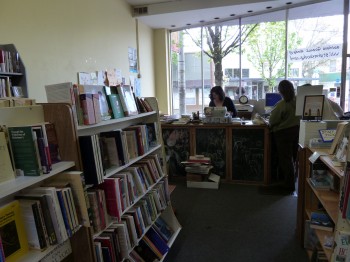 What’s in your ideal—but realistic—box of used books? There are three kinds of perfect buys that wander into the store. One is the box with a range of interesting, current books in great condition. No old library books, no battered Tom Clancys—things that we don’t see every day but know our customers want. The second is a good collection of books around a single topic, with the coherence of a personal library. We have that happen sometimes, with estates or when a person changes tracks in life. Boxes like this educate us about what knowledgeable people want to read about that subject. Right now we have some incredible books on palaeontology and natural history, from a person who switched careers from science writer to carnivorous-plant nursery owner. The third cool buy is the single treasure, maybe hidden among ordinary books, that makes us coo and bubble with the pleasure of seeing it. This doesn’t happen often, but it’s delightful when it does. It might be a really beautiful 1890s parlor set of Dumas, with pretty typography and ornament; or it could be a tiny, shy, craft-wrapped 1960s fine-press reprint of a short story, with knockout illustrations by a notable artist. They happen.
What’s in your ideal—but realistic—box of used books? There are three kinds of perfect buys that wander into the store. One is the box with a range of interesting, current books in great condition. No old library books, no battered Tom Clancys—things that we don’t see every day but know our customers want. The second is a good collection of books around a single topic, with the coherence of a personal library. We have that happen sometimes, with estates or when a person changes tracks in life. Boxes like this educate us about what knowledgeable people want to read about that subject. Right now we have some incredible books on palaeontology and natural history, from a person who switched careers from science writer to carnivorous-plant nursery owner. The third cool buy is the single treasure, maybe hidden among ordinary books, that makes us coo and bubble with the pleasure of seeing it. This doesn’t happen often, but it’s delightful when it does. It might be a really beautiful 1890s parlor set of Dumas, with pretty typography and ornament; or it could be a tiny, shy, craft-wrapped 1960s fine-press reprint of a short story, with knockout illustrations by a notable artist. They happen.You are always very involved in the greater community in both the virtual and the real worlds and specifically in your neighborhood of St. Johns. We want people who live and work nearby to feel that their neighborhood is a good place to be, more than just a place where they sleep or work. And we want them to feel that they can use the whole neighborhood, find activities, get out and walk around and be part of life here. For that to happen, there needs to be life here. We try to make being in St. Johns fun. We discount to neighborhood employees and organizations partly because anyone who works in this neighborhood works as hard as we do—but partly because we believe in closing the loop. Money earned in this neighborhood should be spent here as much as possible. We ask people to support us, so we try to make it easy. And we do what we can to support our neighbors in return. We firmly believe that if we’re not looking to our neighbors first, for our coffee or our produce or whatever, we have no right to be disappointed when they don’t come to us first for their books.
We mostly communicate with our customers through Facebook and the website, because they appear to be places our customers go and because they allow us to share meaningful kinds of content. Judging by the pattern of responses, Facebook is something that many people keep sort of running in the background during the day. We like to feature books, of course—both current ones that can be linked from our website and special used ones that will show how fun and interesting it can be to browse our shelves and find treasures.
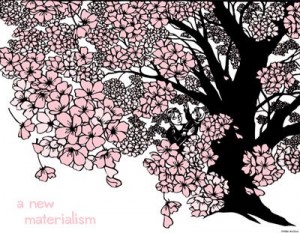 You have some great window displays. Would you talk about the importance of what might seem to be a rather old-fashioned art, window dressing, and your specific process? We’re centrally located in our neighborhood, very visible, with two windows. One of these is very big, one of the largest on the street. However, our building is over eighty years old and has lived hard. So our front end needs something in it to keep it interesting and appealing.
You have some great window displays. Would you talk about the importance of what might seem to be a rather old-fashioned art, window dressing, and your specific process? We’re centrally located in our neighborhood, very visible, with two windows. One of these is very big, one of the largest on the street. However, our building is over eighty years old and has lived hard. So our front end needs something in it to keep it interesting and appealing.
The tricky thing is that our larger window gets a lot of sunlight, which fades and tans books, so we need to suggest booky love without using very many actual books. When we do major displays ourselves, we tend to stay within a theme. We try to connect books with comfort and pleasure and peace. So we use cozy old furniture and picturesque oddments, combined with seasonal elements. What Nikki McClure does with her calendars—we’re shooting for a similar thoughtful moment when people stop and look at the window.
How has the neighborhood changed in recent years? The neighborhood is denser, with apartments and condos on blocks that used to be one empty industrial building, or an old grocery store. More people means more opportunities to connect, and be their bookstore. The demographics are interesting, definitely those of a neighborhood in transition. We have customers who have lived here for decades, worked industrial jobs, and have retired. We also have recent newcomers, young families in their first houses, or childfree creative folk looking for an affordable neighborhood to settle in. They all have quite different reading and spending habits. The cool thing is that Portland has taken very clear steps to make old close-in neighborhood cores like this important, with moderate increases in allowed density and serious attention to the availability of transit. So our little downtown area, which has been here for 150 years, is now being valued for the role it plays in reducing car use and giving people a real alternative to suburban car-based living.
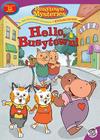 That question relates to what seems to be an issue that’s not going away anytime soon: the rather clear-cut divide between Portlanders who think St. Johns is a inaccessible, scary, and/or depressing neighborhood and those who believe the opposite. Do you have any thoughts on that beyond exasperation? I run into this issue every time we have an author event. People who haven’t been here before call, ask for directions, ask if it’s far. The difference is mainly between people who have been here and people who haven’t. When someone refers to St. Johns as “the hood,” I ask them if there’s anything like it in Chicago or LA. When a friend says, “Do I have to come all the way up there to see you?” I mention that it’s just as far for me to go there as for her to come here. People who are used to car life get confused by any place that doesn’t have a handy freeway exit. We’re well away from freeway traffic and freeway noise—but only fifteen minutes from Portland city center! People who actually visit here see a classic, cozy, old-fashioned small town that reminds me of Richard Scarry’s Busytown, with some historic buildings, a variety of different useful shops (not just destination boutiques), cafes, a school, a post office, a supermarket, and more acreage devoted to parks than any other part of Portland. They remark on the beauty of our iconic bridge, the charm of our mix of older houses with yards and nice new condos, the affordability of living here—and the very short trip it took to get here.
That question relates to what seems to be an issue that’s not going away anytime soon: the rather clear-cut divide between Portlanders who think St. Johns is a inaccessible, scary, and/or depressing neighborhood and those who believe the opposite. Do you have any thoughts on that beyond exasperation? I run into this issue every time we have an author event. People who haven’t been here before call, ask for directions, ask if it’s far. The difference is mainly between people who have been here and people who haven’t. When someone refers to St. Johns as “the hood,” I ask them if there’s anything like it in Chicago or LA. When a friend says, “Do I have to come all the way up there to see you?” I mention that it’s just as far for me to go there as for her to come here. People who are used to car life get confused by any place that doesn’t have a handy freeway exit. We’re well away from freeway traffic and freeway noise—but only fifteen minutes from Portland city center! People who actually visit here see a classic, cozy, old-fashioned small town that reminds me of Richard Scarry’s Busytown, with some historic buildings, a variety of different useful shops (not just destination boutiques), cafes, a school, a post office, a supermarket, and more acreage devoted to parks than any other part of Portland. They remark on the beauty of our iconic bridge, the charm of our mix of older houses with yards and nice new condos, the affordability of living here—and the very short trip it took to get here.
What art form besides writing really ignites the reader/booklover/word arts side of you? Years ago I was a publicist at another bookstore, and read all the books by the authors I was hosting. It was part of the job, but at that time that bookstore was having up to six events per week! I was reading very fast, and reading a lot of books I wouldn’t have chosen, sometimes good ones but sometimes not. I wasn’t reading deeply or joyfully. Then a friend demanded that I help him with a volunteer gig at National Poetry Slam 2001, a performance poetry competition. I took a few days off from work and went. That was an amazing, moving experience, especially after the early rounds were over and I got to hear the people who made it to the semifinals. The top poets there were kicking out material that broke something open for me. I hadn’t realized until then that I had become rather numb to words—a really sad thing for a bookseller.
Kristin Thiel is senior editor and director of community engagement at Indigo Editing & Publications. She reviews books regularly, and has fiction forthcoming in Men Undressed: Women Writers on the Male Sexual Experience (Other Voices Books/Dzanc Books). She has volunteered at the PNBA tradeshow for five years.

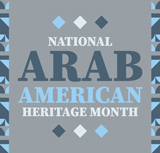
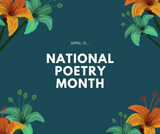
I am an infrequent visitor (I live in Tacoma, WA) but my daughter has a house in St. John’s and introduced me to Nena and her store. My grandson, daughter and I spent a rainy morning there last week and I was impressed by the breadth of her collection, her real love of books, kids and the neighborhood. I will try to check the store out every time I’m in Portland.